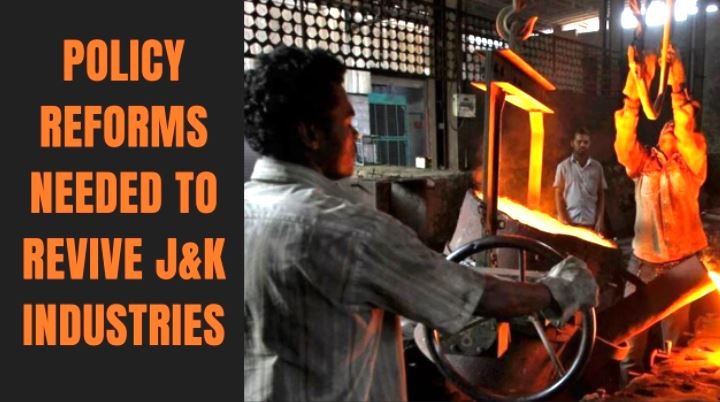The industrial sector of Jammu and Kashmir is essential to the region’s economic framework, significantly contributing to local employment and promoting socio-economic stability. Nevertheless, this vital sector is currently experiencing a significant downturn as a result of systemic neglect and dwindling fiscal incentives. The urgency for prompt action transcends mere survival; it is a strategic imperative aimed at protecting the livelihoods of countless workers and ensuring the continued advancement of the region’s industrial landscape. The seriousness of the situation necessitates prompt and resolute measures from both the central and Union Territory governments to prevent an approaching crisis.
Historically, the industrial units in Jammu and Kashmir have operated under challenging conditions. Locational disadvantages, coupled with years of militancy and limited access to broader markets, have created a precarious environment for businesses. Recognizing these hardships, successive governments extended fiscal incentives and policy support to nurture the industrial sector. These measures not only spurred growth but also provided a lifeline for the local workforce, with industries becoming key contributors to direct and indirect employment. However, the abrogation of Article 370 brought with it a policy shift that has inadvertently sidelined existing industries. Fiscal support, once a cornerstone of industrial sustenance, has seen significant dilution, leaving many units struggling to stay afloat. The reduction in fiscal incentives has been stark. Reports indicate that the annual UT and central fiscal allocation for industries has plummeted from approximately ₹1,800 crore to a mere ₹500 crore. While the Central Package of Incentives 2021 under the NCSS-2021 scheme promised ₹28,400 crore, only a minuscule fraction—around₹582 crore—was earmarked for existing units. This allocation, accounting for barely 2% of the total package, underscores the systemic neglect faced by established industries. The disparity is glaring, especially when juxtaposed with the incentives extended to new units. Such an imbalance not only jeopardizes the viability of long-standing businesses but also undermines the principle of equitable industrial development. Compounding these issues is the bureaucratic inefficiency that delays the disbursement of already diminished incentives. Payments under turnover incentives and Goods and Services Tax (GST) reimbursements have been erratic and delayed, creating cash flow challenges for businesses. The release of just 15% of claims for the 2021-22 period, with no clarity on subsequent payments, exemplifies the administrative bottlenecks plaguing the system. These delays further exacerbate the financial strain on industries, pushing them closer to closure and triggering fears of mass retrenchment. The repercussions of industrial decline extend far beyond economic parameters. The potential closure of existing units could unleash a wave of unemployment, destabilizing the socio-economic fabric of the region. Lakhs of workers directly or indirectly dependent on these industries face the grim prospect of losing their livelihoods. Additionally, the decline of the industrial sector would weaken Jammu and Kashmir’s economic base, making it even more reliant on external support. Such a scenario would be a significant setback to the government’s vision of self-reliance and sustainable development for the region. Industrialists and stakeholders have consistently highlighted these issues, urging the government to address policy neglect and provide a conducive environment for industrial growth. Their demands are clear and reasonable: parity in fiscal incentives with new units, timely disbursement of turnover incentives and GST reimbursements, and the creation of a level playing field that allows established industries to compete effectively. These measures are not mere concessions but essential steps to revive confidence among industrialists and prospective entrepreneurs and stabilize the sector. The government must recognize the strategic importance of existing industries in Jammu and Kashmir. These units represent not just economic assets but also symbols of resilience and local enterprise. By prioritizing their revival, the administration can send a powerful message of commitment to balanced regional development. Ensuring fiscal parity, streamlining administrative processes, and fostering a supportive industrial ecosystem is imperative for reversing the current trajectory and enabling sustainable growth.
In short, the plight of Jammu and Kashmir’s industrial sector is a wake-up call that demands immediate and concerted action. The government has a responsibility to uphold the legacy of industrial development in the region and to protect the livelihoods that depend on it. Addressing the long-standing policy neglect and reinstating robust fiscal incentives is not just a matter of economic pragmatism but a moral imperative. Time is of the essence, and the need for intervention has never been more urgent. It is imperative to restore equitable fiscal support, expedite pending reimbursements, and create a conducive environment for these industries to compete and thrive. It is essential for the leadership to prioritize the survival and growth of these units, ensuring they receive the necessary support to continue contributing to the local economy.
#JammuAndKashmir #IndustrialSupport #FiscalIncentives #J&KIndustries #EconomicStability #BusinessEnvironment #PolicySupport #IndustrialGrowth #SaveExistingUnits #EmploymentGeneration #JobPreservation #BusinessRevival #EconomicChallenges #JammuKashmirEconomy #GovernmentIntervention




